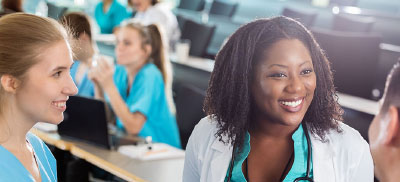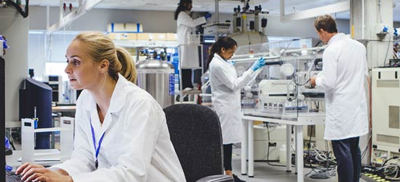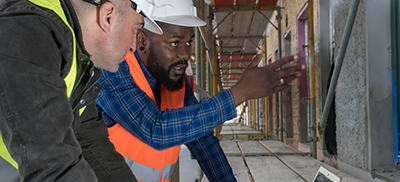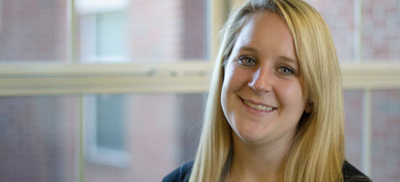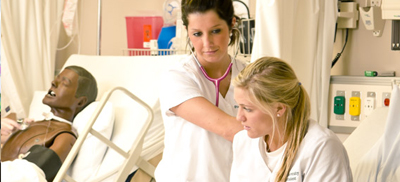Stevenson University is proud to host the 8th Annual Statewide Maryland Out of School Time Network (MOST) Conference on January 9 and 10, 2018. MOST strives to develop and improve out of school opportunities for Maryland’s youth. As a statewide youth development organization, their mission involves creating a community to “expand funding, implement more effective policies, and support increased program quality for youth opportunities in the out of school hours.”
This year’s conference, “Opening Doors. Transforming Lives.” invites keynote speaker David Shapiro, the CEO of MENTOR: The National Mentoring Partnership. Attendees will have the opportunity to attend three workshops to be announced at a later date.
Stevenson spoke with Jocelyn Koller, the University of Maryland Extension 1890 Program 4-H STEM Senior Associate Agent, about her connection to MOST and her experiences at their annual conferences.
As a Senior Associate Agent, I provide leadership to the 4-H STEM initiative that seeks to enhance and expand 4-H STEM programming in Worcester, Wicomico, and Somerset counties. The goal of the 4-H STEM program includes teaching youth STEM curricula in an inclusive and supportive setting, while also developing leadership and life skills to empower youth to reach their full potential.
Our connection to MOST has been invaluable in many ways. We have collaborated with MOST to offer three STEM educator workshops on the Eastern Shore for the following 4-H curricula: Junk Drawer Robotics, Power of Wind, and Agsploration. These train-the-trainer sessions provided not only the curricula, but also the opportunity for educators to learn about and implement 4-H experiential learning activities in their afterschool programs. Additionally, MOST offers an annual statewide conference where fellow afterschool educators, directors, and volunteers can connect to learn from one another in order to grow their programs. Lastly, MOST provides a monthly newsletter that is brimming with valuable information such as programs, grants, employment, and professional development opportunities.
In reference to the MOST conference, there are many advantages to attending, including making connections across city/county and program lines, learning about best practices from Garrett to Worcester, and hearing about numerous opportunities for you, your staff, your students, and your community. It is an opportunity to step out of the silos that we often find ourselves within to have the opportunity to create partnerships that will strengthen and improve our Out of School Time (OST) programs in Maryland. A very tangible example of this occurred at last year’s program. I attended the panel discussion where Max Levitt, founder of Leveling the Playing Field, spoke about how his non-profit organization provides underserved youth with athletic equipment. Shortly after the conference, a fellow 4-H educator mentioned that she was planning to offer a 4-H STEM Golf camp at UMES and a lightbulb went off in my head. I told her about Leveling the Playing Field and we decided to reach out to Max to ask if he would be able to donate some golf clubs. His reply, “We would love to help out.” At graduation, each STEM golf camper received a set of golf clubs thanks to Leveling the Playing Field so that each participant could return home ready to practice the skills that they had learned at the camp. This wonderful opportunity for our youth was made possible because of the MOST Conference. I did not know about Leveling the Playing Field before the conference, and now I cannot sing their praises enough.
The conference is a wonderful place to learn from other OST leaders. Another concrete example that comes to mind is from the 2016 MOST Conference. I attended a talk by Code in the Schools Founder and Executive Director, Gretchen LeGrand. The presentation was very informative regarding different types of computer science platforms, and Gretchen provided us with a sheet of these resources, but the thing that I remember most was the awesome banana piano! You could play a banana piano using a device called a Makey Makey. I had never seen this before. As a STEM educator, the field is ever-changing and it is important to keep your programs on the cutting-edge. By attending the MOST STEM conference workshops, I am able to dialogue with state OST leaders in the field of STEM to learn about new technologies, innovations, experiments, and activities that we can incorporate within our 4-H STEM programs. Thanks to the MOST Conference Workshop presented by Code in the Schools, we now use the Makey Makey to create celery pianos!
—
Stevenson University encourages educators to attend the MOST conference and take the opportunity to learn more from their fellow professionals in the field. Educators interested in furthering their knowledge about teaching in the non-formal educational sector can also apply to Stevenson University Online certificate or master’s programs in Community-Based Education & Leadership. These programs are designed to meet the growing demand for highly-qualified professionals to teach, lead, and manage in non-formal and informal education settings. Practicing professionals will gain the knowledge and skills to become effective educators and change leaders in their organizations. Upon completion of the master’s program, graduates will obtain the ability to meet the needs of diverse populations of learners, build transformative learning communities, and foster collaborative partnerships within the expanding non-formal educational sector.
We had the opportunity to speak with current student Stephen Bowley who commented on Stevenson’s Community-Based Education & Leadership master’s program:
While the coursework has been time consuming and often challenging, I have grown so much in my short time as a Stevenson University Online student. The projects and assignments given are meaningful and relevant to the actual work you are currently doing or hope to complete in the future. Our classroom discussion boards allow you to gain perspectives on your thoughts from others and to see things through more than just your own lens. In this program, I have some of the better professors I have had in my education career and they push us to be a better version of ourselves. I can really appreciate the human element in them and their transparency with me. When I have earned my degree, I can see myself as an effective leader who is equipped to handle the rigors of community-based education and has the ability to help neighborhoods flourish.
